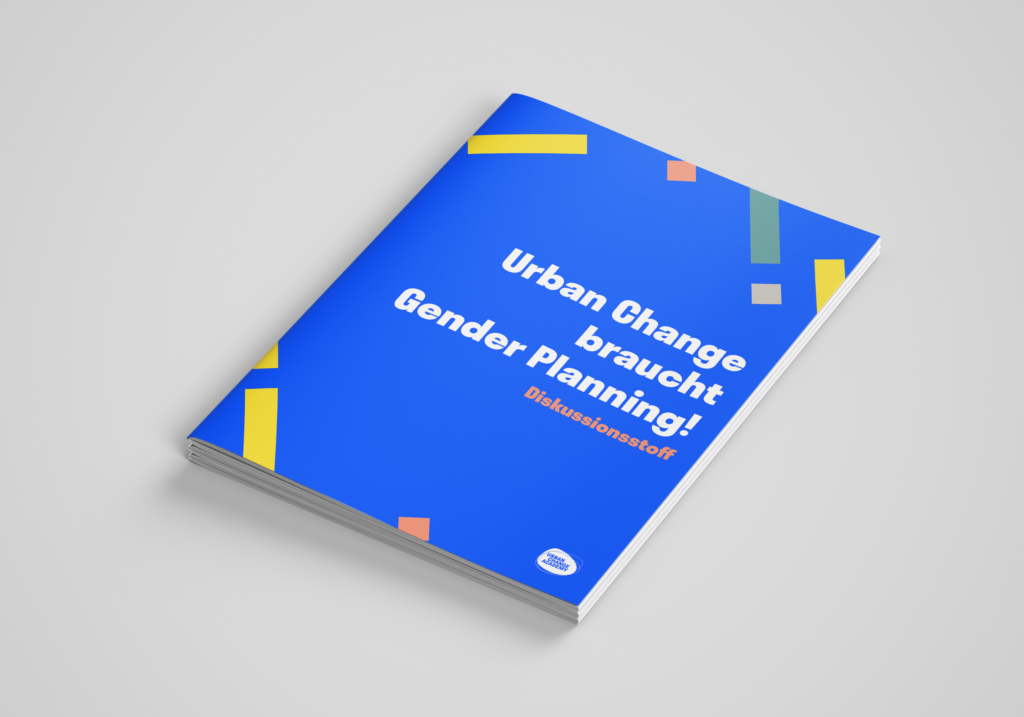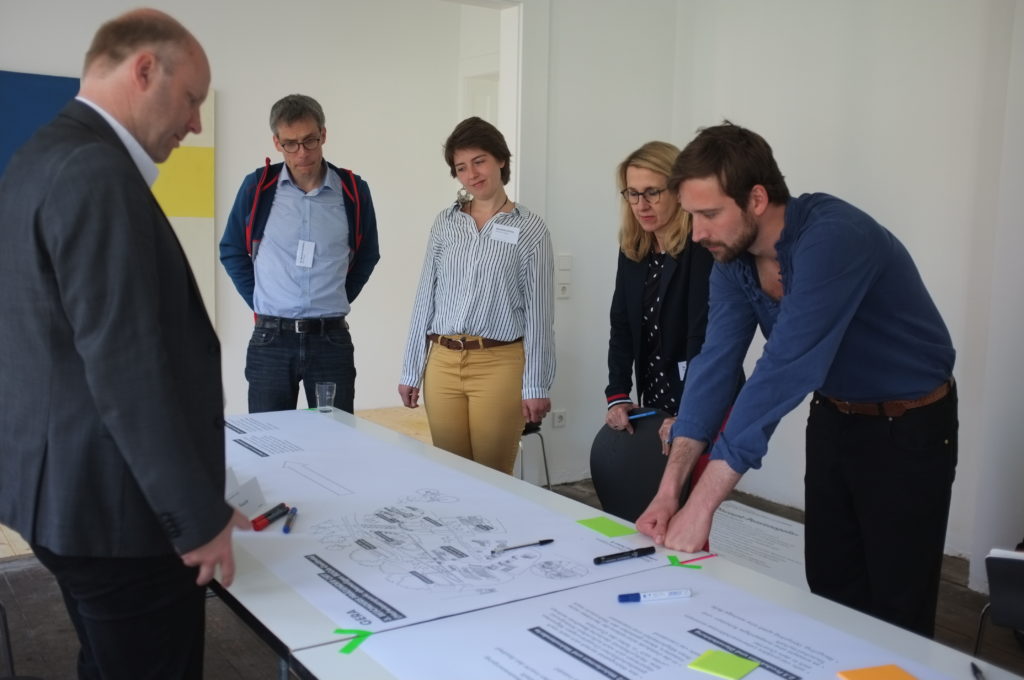Urban Change Academy: What impact does the Covid crisis have on your work?
Alexander Bechtel: Actually very, very little, because I have always been able to work when and where I want. This means I’ve always done a lot of work at home, especially during my doctorate. I was free to move back and forth between the office and my office at home. And my team at Deutsche Bank works completely remotely anyway. My boss is in Hamburg and my other colleagues are in Frankfurt, Berlin and Munich. Everything is 100% remote for us anyway. We used to meet once a month in Frankfurt, but that’s no longer the case. But apart from that, very little has changed in my day-to-day work. I no longer go to the Deutsche Bank office in Zurich but sit here at home. But that’s nothing out of the ordinary for me.
What was the most surprising realisation for you in the pandemic year?
You only miss things when you don’t have them anymore: the personal exchange with people, getting out, going away sometimes; you only realise how important that is when you can’t do it anymore. I think that was a realisation for me. I’m someone who is always very focused, who also works a lot and who hasn’t taken that many holidays in the past few years, I now really miss going out and not always sitting at home within my own four walls.
And with regards to the financial system: Were there any surprises?
Well, I was positively surprised by how quickly things went, that everyone stuck together and helped, that the banking sector granted loans very quickly, that the state also reacted quickly with aid packages, that people were courageous and put a lot of money in their hands. That’s one reason why we’re still doing so well today, despite everything, and why things don’t look so dark. That was a positive surprise. A negative surprise was clearly – although somewhat less related to monetary policy – the whole denial of the Covid crisis. I have my own problems with that.
Central banks and states are currently providing an incredible amount of liquidity. What effects do these Covid aidpackages have on the entire monetary and financial world? You have to distinguish between aid packages – What is fiscal policy and what is monetary policy? Fiscal policy is the aid packages that come from the state. In the end, the state goes into debt in order to by able to give bridging loans. And the other is monetary policy, the liquidity that you just mentioned. I think both are important and necessary to get us through the next few months. Imagine if we hadn’t done that and if there hadn’t been these bridging loans, then a large number of shops, restaurants and hairdressers would have gone bankrupt. A lot of infrastructure would have been destroyed, and we want to avoid that at all costs. And that’s exactly what the state is there for, to spend money in times of crisis to provide a bridge through difficult periods. That’s why I think both the state’s aid packages, i.e. fiscal policy, and the expansive monetary policy are important, because they also have a supporting effect, of course.
There is always the fear of inflation. How do you assess that?
If you pump a lot of liquidity into the market, there is always the danger of inflation, of course. In the short term, there is more a danger of deflation. That means that in the next one, two, maybe three years it is more about preventing deflation rather than being afraid of inflation. The question is, what happens in the medium and long term? Inflation rates always rise when the liquidity that the central bank creates also enters the market, i.e. when banks start lending. All the liquidity that the central bank has created is largely sitting in the banking sector. But it is not yet being passed on – why? Because there is no demand, because there is no economic growth. But when the economy opens up again, when people start consuming again, then these loans will be in demand again, and if that happens to a very large extent and very quickly, then something like that can explode and become uncontrollable for the central bank. And this potential is just lying dormant. This means that the central bank will have great difficulty in being consistent and saying: “Now we have to be careful that all this liquidity doesn’t slip through our fingers and lead to inflation.”
One thing is important to me, just because there is a lot of liquidity in the system now, it does not automatically mean that we will see inflation in five years. One can also imagine many situations in which that will not happen.
How does the current economic crisis differ from historical economic crises such as the financial crisis of 2008? Arethere any differences?
Yes, definitely, there are some very big differences. What we are seeing today is what economists call an exogenous shock. This means that something from the outside led to a crisis. In this case, it was a pandemic. Neither the banks nor the industry can do anything about it as nobody made a mistake. If you compare it with the last big financial crisis in 2007, 2008, 2009 – that was a crisis that came from the system itself. It came from the fact that far too many real estate loans were granted in the USA; this meant that banks then went into debt and banks invested in securitised loans that were junk securities. A few years later, there was the euro debt crisis – that was a crisis that came from the fact that the European states were too heavily indebted. These are all endogenous crises that developed out of the system itself, whereas this current pandemic is an exogenous crisis – like a meteorite that strikes suddenly. It’s something we have to deal with.
What do you expect for this year within the financial world? What will happen? And what must not happen under any circumstances?
Of course, it all depends on how the crisis continues. If the vaccine works soon and we can open up the economy again, then I think we will have come through this crisis relatively smoothly. Sure, we have a higher debt ratio, but it is no higher than it perhaps was ten years ago. So, I would say that we have managed really well in Germany. It will be problematic if there is a third, fourth or fifth wave and we live more or less in lockdown for another year.
Then, of course, at some point the question will arise – can we keep the economy alive somehow by granting more and more loans? Loans won’t work forever. The state does not have infinitely deep pockets and the central bank only has a limited amount of influence on all these things.
Is there anything related to the Covid virus and the economy, be it macroeconomically or inside companies, that worries you?
There will be industries that will continue to suffer after Covid because there will be less demand for them. This will include airlines, for example. It will take a very long time before we are back to the level we were at before the crisis, i.e. that people travel so much. This means that a company like Lufthansa cannot avoid laying off lots of people and scaling back in order to survive. This is just one example of the many sectors that will suffer. But that doesn’t mean that the money that was previously spent on these will not be spent on something else. Then the question arises – do I think this is systematically bad? We economists always call this “deadweight loss”. Is something being lost or is consumption simply shifting somewhere else? You can find that good or bad, but as long as consumption and economic output are still there, the economy, at least as a whole, will not be damaged. Right now, I don’t see there being a massive “deadweight loss”. As I said, all this is assuming that we don’t have another fourth, fifth, sixth wave in the next few months. Should that be the case, then I see the biggest problem being that infrastructure will be lost and this can take years to recover.
What about culture and the creative sectors? Are they included in all the forecasts?
I think this is a good example of what can happen if the pandemic lasts too long, because this will mean that things break and can no longer be repaired. We’ll do long-term damage if we don’t bridge that time and keep people and businesses alive. If artists are forced to give up their professions, they might not come back after the crisis.
What do you think Covid means for the future of money?
What we see now is that people are already paying much more digitally, i.e. cashless. This is something that people wanted before. Many shops stopped accepting cash because there was fear that cash could be a possible way of transmitting the virus. I think that led a lot of people to realise that cashless payments are actually quite convenient. And I think this trend will continue. Many people have now got used to this way of paying. There are statistics from the Bundesbank that clearly show that cashless payments have increased a lot in recent months.
What else can we expect in terms of financial technology in the city of the future?
One vision is that we will have an “economy of things” in the future. This means things will become economic agents: a car will become an economic agent, a parking meter, or a rubbish container can become economic agents and these things will also make payments in the future. Let’s assume that we will have self-driving cars in the future. That is, I leave my flat, press my smartphone and a car drives by autonomously, gives me a lift, drives me into the city centre and parks in a multi-storey car park. The car also pays for the parking garage. I don’t have to do anything more. It then picks me up again, drives me home again and then the car drives to the next charging station, recharges itself and also pays the charging station directly. And if I have a subscription, everything is billed transparently for me, so in the end I don’t have to worry about anything. These are all things that are possible with new technology. It’s about IoT (internet of things): objects, like a car, can become economic participants that can make payments.
How soon do you expect such developments to happen?
These things are already technically possible today. There are already some initial prototypes; Bosch, for example, is working on a charging station concept with which a car can pay a charging station, or a car can pay a parking meter. But the infrastructure for this still needs to be built. I would say that we will see the first prototypes in the next few years, that it will become completely normal for us that our car pays our bills. We are talking about ten years plus.
Are there other phenomena that we are not observing yet, but that you expect for the cities of the future?
Yes, I can become a shareholder in my city by making the city investable. For example, I can become the owner of a parking garage by tokenising it. Today, I can only sell the car park as a whole entity. And as such, investments like these can only be shouldered by large investors. Things would be different in a world where I can tokenise things and make them investable. Let’s say the car park is divided into a million tokens and everyone can own one token. That means I would end up owning 0.0001 per cent of that car park and then I also get a share in the returns that the car park generates. If an autonomous vehicle parks in the car park and drives out again at the end of the day and pays its parking fee, I immediately receive a part of this parking fee transferred to my mobile phone. Something like this will be possible in the future and it’s not bad for a community, as such concepts enable participation. I can become an investor in my community and finance projects. Let’s say a new multi-storey car park is to be built and you’re asked whether you want to invest in it. Then you simply buy a per centage of it and contribute to the realisation of such projects in your neighbourhood. But it’s also possible that a taxi driver in Japan could invest five euros in this car park, which means there is a much larger investor base, so that I can perhaps also implement projects more easily. It will become a bit more democratic.
You briefly touched on the importance of IoT (internet of things) for the future of cities. What other developments can we expect in this area?
Parking sensors in the ground, for example. Every parking space has a small sensor in the ground which shows you which parking space is free or not. That means you no longer have to drive your car for hours through the streets, but you have an app and you can see where there are free parking spaces, and you can drive there immediately. Then you can say – to take up the example of tokenisation again – maybe this is a private parking space belonging to someone who rents it. But, because the owner is at work during the day, he simply can rent out the parking space. That means I tokenise the parking space and the person who is then parking on it can log in, the car then pays for the parking space and the money ends up directly in my wallet as the owner of the parking space.
Another example is rubbish bins that have to be emptied but the collection points are a bit further away from my home, so I don’t want to drive there every day. I can install a small sensor that tells me when the bin is full. That way, the bin only has to be emptied when it’s really full. I think if you think about it a bit, you can think of many, many more things.
Which of your skills have helped you to respond to change, especially during these times?
I think I am generally open and someone who is interested in new things. You can also see this in the fact that I work on innovation topics professionally. I am generally not afraid of change; I find it exciting. I don’t think that’s a disadvantage in the pandemic because things are changing, and the fate of many things is uncertain. Because in my job I generally have to deal with a lot of things that we don’t yet understand and that may have a big impact on us in the future, what we are experiencing now in the pandemic perhaps shocks me less and I worry less.
What skills do you think cities need to get through the crisis?
We need the courage to change and not always stick to old concepts for too long. If we think that shared mobility is a good idea or if we think that cycling should be promoted, then we simply have to be courageous and move forward. If necessary, we also have to fight against car lobbyists, for example. Some courage in politics and in companies would help, because I think there is a relatively large consensus on some fundamental points about what would be good for our cities. And there are always interest groups that oppose this and want to defend the status quo. In these situations, it takes courage to stand up.
Thank you very much.
Photo: © Alexander Bechtel




